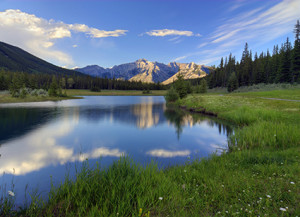“…man is not the lord of creation, with an omnipotent will, but a part of creation, with limitations, who ought to observe a decent humility in the face of the inscrutable.”
Richard Weaver
Pope Francis’ recently released Encyclical on the environment (Ladauto Si’) drew dismissive comments from two Catholic GOP presidential candidates. Just before the Encyclical was released, Rick Santorum commented “...we probably are better off leaving science to the scientists and focusing on what we’re really good at, which is … theology and morality.” After its release, Jeb Bush quipped “I don’t get economic policy from my bishops or my cardinals or my pope.” Bush also added that religion “ought to be about making us better as people, less about things [that] end up getting into the political realm.”
 These comments are striking in just how selective and limiting they portray the role of faith. As Christians, it can be assumed that both Santorum and Bush believe that God created the earth and charged man with its stewardship. If so, it is hard to understand how they can dismiss care of the environment–whether the issue is climate change, mercury pollution that harms the unborn, or wildlife protection–as being completely outside the realm of faith and morality. Such an attitude is impious.
These comments are striking in just how selective and limiting they portray the role of faith. As Christians, it can be assumed that both Santorum and Bush believe that God created the earth and charged man with its stewardship. If so, it is hard to understand how they can dismiss care of the environment–whether the issue is climate change, mercury pollution that harms the unborn, or wildlife protection–as being completely outside the realm of faith and morality. Such an attitude is impious.
In a speech to the 1990 World Climate Conference, the late British Prime Minister Margaret Thatcher properly framed safeguarding our planet’s ecology as a “duty.” She said “We must remember our duty to Nature before it is too late. That duty is constant. It is never completed…It will weigh on our shoulders for as long as we wish to dwell on a living and thriving planet, and hand it on to our children and theirs.”
She recognized the moral imperative of addressing climate change 26 years ago, and yet here we have candidates today who seem mostly concerned with avoiding that duty.
While the Pope’s challenge on climate change is what Bush and Santorum were probably reacting to, the Encyclical broadly addressed our obligation to be good stewards of creation. Which is as it should be. Climate change is only one of many challenges we face.
Just last week a very conservative study published in the Journal of Science Advances found that because of human actions the earth is experiencing a mass extinction of wildlife species. Extinction rates over the past century are up to 100 times higher than natural average background rates. The report notes that “loss of biodiversity is one of the most critical current environmental problems, threatening valuable ecosystem services and human well-being.” Statistics from World Wildlife Fund (WWF) reveal that since 1970 we have lost 52 percent of earth’s bird, mammal, fish, reptile and amphibian populations.
In another study that came out last week, scientists at University of California, Irvine found that nearly a third of the world’s 37 largest freshwater aquifers are being drained faster than they are being replenished.
And earlier this year a study published in the American Medical Association’s journal JAMA Psychiatry found that a common pollutant in vehicle exhaust, power plant emissions and cigarette smoke can shrink white matter in the fetal brains of humans and cause developmental damage during the toddler years.
Under the most fundamental standard of stewardship, safeguarding the ability of earth to sustain life, we appear to be falling short.
One does not have to agree with every word in Laudato Si’ in order to take the stewardship message seriously and be, as President Reagan once said, “worried about what man has done and is doing to this magical planet that God gave us.”
One can find similar concerns and warnings contained in Pope John Paul II’s 1991 Encyclical Centesimus Annus. In it the Pope wrote:
“Man, who discovers his capacity to transform and in a certain sense create the world through his own work, forgets that this is always based on God’s prior and original gift of the things that are. Man thinks that he can make arbitrary use of the earth, subjecting it without restraint to his will, as though it did not have its own requisites and a prior God-given purpose, which man can indeed develop but must not betray. Instead of carrying out his role as a cooperator with God in the work of creation, man sets himself up in place of God and thus ends up provoking a rebellion on the part of nature, which is more tyrannized than governed by him.”
Whether Santorum and Bush want to acknowledge it or not, the reality is that most of the environmental threats facing earth and its life-sustaining ecology are the result of human decisions and actions–and none of them fall outside the purview of faith and morality.
President Reagan, after expressing concern for the health of our planet, wisely pointed out: “This is our patrimony. This is what we leave to our children. And our great moral responsibility is to leave it to them either as we found it or better than we found it.”
